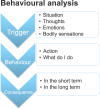Intensive group-based cognitive therapy in patients with cardiac disease and psychological distress-a randomized controlled trial protocol
- PMID: 34271952
- PMCID: PMC8283384
- DOI: 10.1186/s13063-021-05405-3
Intensive group-based cognitive therapy in patients with cardiac disease and psychological distress-a randomized controlled trial protocol
Abstract
Background: Many patients with coronary artery disease (CAD) and valvular heart disease (VHD) suffer from psychological distress. Such stress is associated with increased morbidity, reduced quality of life and delayed return to work. European guidelines emphasize recognition and intervention, but evidence-based treatment options are limited and perceived as costly. The present study will test the effect of brief, group-based cognitive therapy as an adjunct to usual cardiac rehabilitation in a randomized design.
Methods: A total of 148 patients with CAD and/or VHD after surgical intervention and concomitant psychological distress (defined as HADS anxiety (A) or depression (D) score ≥8) will be randomized to either usual out-patient cardiac rehabilitation (CR) comprising an 8-week multidisciplinary programme or usual care supplemented by five group-based cognitive therapy sessions performed by trained CR nurses. A structured, standardized treatment manual will be used. Patients will be randomized 1:1 at three different sites. Additionally, a non-randomized sub-group of 40 matched patients without signs of psychological distress will be followed to investigate spontaneous variation in HADS. The primary outcome is Hospital Anxiety and Depression Score (HADS). Secondary outcomes are adherence to cardiac rehabilitation (CR), health-related quality of life measured by HeartQoL, time to return to work, adherence to lifestyle interventions and cardiovascular readmissions. Patients are followed up for 12 months.
Discussion: To our knowledge, this is the first randomized controlled trial (RCT) on patients with cardiac disease with an intensive group-based programme of cognitive therapy performed by CR nurses, which makes it affordable and widely implementable. The outcome will elucidate the feasibility and effect of cognitive therapy as an adjunct to CR in patients with post-surgery CAD and/or VHD and psychological distress and could possibly benefit patients with other heart conditions as well. The clinical trial complies with the Declaration of Helsinki. The trial has been approved by The Regional Research Ethics Committee (file number H-16042832) and The Danish Data Protection Agency. The results will be disseminated as original research in peer-reviewed manuscripts.
Trial registration: www.clinicaltrials.gov NCT04254315 . Retrospectively registered on 30 January 2020.
Keywords: Anxiety; Cardiac rehabilitation; Cognitive therapy; Coronary heart disease; Depression; HADS; Psychological distress.
© 2021. The Author(s).
Conflict of interest statement
The authors declare that they have no competing interests.
Figures




References
-
- Lichtman JH, Froelicher ES, Blumenthal JA, Carney RM, Doering LV, Frasure-Smith N, m.fl Depression as a risk factor for poor prognosis among patients with acute coronary syndrome: systematic review and recommendations: a scientific statement from the American Heart Association. Circulation. 2014;129(12):1350–1369. doi: 10.1161/CIR.0000000000000019. - DOI - PubMed
-
- Murphy B, Le Grande M, Alvarenga M, Worcester M, Jackson A. Anxiety and depression after a cardiac event: prevalence and predictors. Front Psychol. 2020;10 Tilgængelig hos: https://www.frontiersin.org/articles/10.3389/fpsyg.2019.03010/full. [henvist 23. marts 2020]. - DOI - PMC - PubMed
Publication types
MeSH terms
Associated data
Grants and funding
LinkOut - more resources
Full Text Sources
Medical
Miscellaneous

